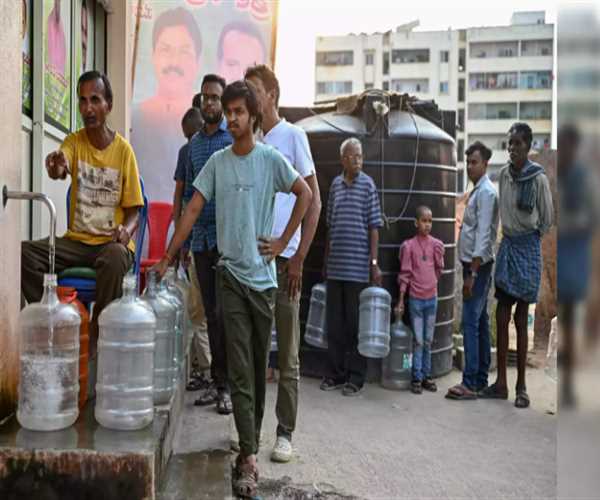
21-Mar-2024 , Updated on 3/22/2024 1:11:53 AM
Bangalore Water crisis is getting hard, locals are leaving the city
Bangalore, India's IT powerhouse, is experiencing its greatest shortage of water in years. Once filled with life and future potential the city is now dealing with empty taps, lengthy lines for water tankers, and a rising feeling of dread among inhabitants.
The Perfect Storm of Thirst
Insufficient monsoon rainfall in recent years have critically reduced water stocks in dams and groundwater resources. Bangalore's population has grown dramatically in current years, putting a pressure on confined water elements.
The encroachment of lake beds and wetlands has notably faded Bangalore's natural water garage capability. Water distribution in the city is unequal, with a few areas receiving very little water supply while others having extra.
The Daily Struggle for Every Single Drop
The impact of the crisis is being felt strongly by Bangalore citizens. Residents must wait for water trucks for hours, if not days. The cost of tanker water has risen dramatically, putting a burden on household budgets. Due to the limited water supply, appropriate hygiene is difficult to maintain, generating health issues. Water shortages have caused problems for restaurants, hotels, and other enterprises, resulting in employment losses and economic hardship. Facing an uncertain future due to water shortages, some inhabitants are deciding to leave the city entirely, affecting the city's social fabric and workforce.
Searching for Solutions: A Call to Action
The water crisis demands immediate and long-term solutions. Water conservation requires promoting rainwater gathering, addressing leaks, and encouraging appropriate water consumption. Revitalizing lakes and wetlands can considerably boost Bangalore's natural water storage capacity.
Improving water supply and distribution networks can result in more equal water distribution. Urban development plans must prioritize water conservation and resource management. Raising awareness of the situation and promoting community-led water conservation activities are critical.
A City at a Crossroads
Bangalore's water trouble serves as a sharp reminder of the challenges offered by way of weather trade, developing urbanization, and unsustainable useful resource management. The metropolis is at a crossroads. The solution calls for a collaborative attempt from people, authorities, and businesses. By taking proper actions and adopting effective strategies, Bangalore can overcome the hassle and ensure a water-stable destiny for future generations.
Impacts of Bangalore Water Crisis
Negative Impacts:
Limited right of entry to clean water can lead to an upward push in waterborne diseases like cholera and typhoid. It can also have an effect on sanitation and hygiene practices. Businesses reliant on a consistent water delivery, like IT businesses and restaurants, ought to face disruptions and closures. This could result in task losses and a decline in monetary activity.
Water shortage can cause competition and war among different companies. There might be protests and social unrest if human beings sense the authorities are not addressing the disaster effectively. Limited water resources could restrict Bangalore's growth ability. People and businesses may be discouraged from transferring to the city if there is not sufficient water to support them.
Potential Positive Impacts:
The situation may additionally pressure Bangalore to hire stricter water conservation measures, along with rainwater harvesting, greywater recycling, and leak detection systems. These steps might also benefit the town in the long run. The hassle may spur funding in new water elements and infrastructure tasks, along with desalination flowers or pipelines that connect remote water sources. The mission can also power improvements in water management technologies, inclusive of greater green irrigation systems or drought-tolerant plants.
The Future Depends on Action:
If Bangalore can enforce suitable water management measures, it'll be capable of alleviating the terrible effects and perhaps convert the disaster into a possibility for innovation and sustainable improvement. Integrating water conservation standards into city design can assure that the town's expansion does not worsen the water state of affairs.
It is vital to educate residents at the blessings of water conservation and proper water use. The Bangalore water predicament is complex, but now not insurmountable. Bangalore can shield its water destiny by means of enforcing preemptive steps and committing to sustainable water management.cThe inconvenience and preserve destiny generations' water stability.

CONTENT WRITER
Writing is my thing. I enjoy crafting blog posts, articles, and marketing materials that connect with readers. I want to entertain and leave a mark with every piece I create. Teaching English complements my writing work. It helps me understand language better and reach diverse audiences. I love empowering others to communicate confidently.
Comments
Join Our Newsletter
Subscribe to our newsletter to receive emails about new views posts, releases and updates.
Copyright 2010 - 2026 MindStick Software Pvt. Ltd. All Rights Reserved Privacy Policy | Terms & Conditions | Cookie Policy